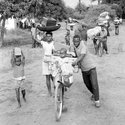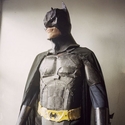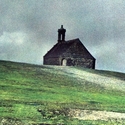David Schonauer
YouTube Friday January 8, 2016
Interviews are some of the most common types of shoots filmmakers are asked to do, but nailing them isn’t always easy, notes Chase Kubasiak from Zacuto in a new tutorial film made for B&H.
He offers advise on topics such as dealing with the space you’re working in (does it fit the look and feel of the piece you’re shooting?) and overcoming problems with ambient noise. The
most important tip, notes NoFilmSchool,
deals with how to make your subjects comfortable. Read the full Story >>
Indiewire Thursday May 28, 2015
n March 2013, Fujifilm discontinued motion picture film production. The following year, first-time filmmaker Hunter Hampton decided to take the opportunity to shoot on Fujifilm stock while it was
still being distributed by third parties around the globe. He bought 10 film rolls off a guy (named Guy) and made a short called Amends, which you can see at Indiewire. “I thought it
would be ironic," said Hampton in an interview with NoFilmSchool, "since it's about technology
and I did it on film." Read the full Story >>
Chicago Tribune Wednesday May 23, 2012
The Chicago Tribune has a memorable collection of
images documenting the past weekend’s clashes between police and protestors during the recent NATO summit. There is also a video interview with photographer Brian Cassella, who shot what may be
the best known of all those images—his picture of a Chicago cop punching a protestor has become an instant classic. “As soon as I looked at the images, I knew the punch one was going to be
a little controversial,” says Cassella. Read the full Story >>
The Conversation Friday May 5, 2023
Nigeria’s Emmanuel Iduma is many things: writer, editor, publisher, critic and photographer. In 2022 he introduced a newsletter, Tender Photo, that has since become an important platform for African photographers, writers, critics and curators. Published on Substack, it has become wildly popular, notes Oxford University researcher Tinashe Mushakavanhu at The Conversation. “The necessity I felt was to be a middleman in the exchange between a photographer and the photograph they took.” says Iduma in an interview.
Read the full Story >>
MovieMaker Monday August 12, 2013
In no discipline is a hands-on education more important than cinematography, declares MovieMaker, which features a penetrating interview with renowned cinematographer (and cinematography teacher)
Sol Negrin as part of its “DIY Monday” series. Negrin shares his ideas about the best ways to learn cinematography: Books on filmmaking, he says, give you only the basics on the technical
aspects of how to make a film, while studying films can provide greater insights. Getting hold of a camera is what works best. Read the full Story >>
The Huffington Post Thursday May 10, 2012
Esteemed celebrity photographer Norman Seeff hasn’t been a full-time photog for 25 years, but his insights into the fundamentals of the craft are shrewd. In a sensitive interview with the
Huffington Post he says the most challenging person he ever worked with was…himself: “My discovery was that true communication is emotion based—emotions are the fuel of the creative
process. In the world I had come from emotions were considered to be an impediment to being objective.” Must read. Read the full Story >>
KICKSTARTER Monday July 25, 2016
Celebrity photographer and creativity guru Jeremy Cowart is getting into the hotel business: Now being crowdfunded at
Kickstarter is his Purpose Hotel — a place, he says, where you can change the world while you sleep. “[E]verything in the building is connected to a cause, or a non-profit. So everything
you're interacting with is helping someone, somewhere in the world,” Cowart says in an interview at DP Review. He hopes to open the first Purpose Hotel in Nashville
within three years. Read the full Story >>
this is the what Tuesday March 4, 2014
Photo editor Kate Osba’s always interesting This Is the What blog recently featured an enlightening interview with Bill Cramer of the online photo agency Wonderful Machine. Among other subjects,
Cramer talks about how his company differs from traditional photo-rep agencies by putting photogs directly in touch with clients, and how he recruits new photographers from the 30 or so inquiries he
receives each week. Read the full Story >>
News Shooter Friday July 10, 2015
Speaking of virtual reality: News Shooter reports on how the BBC is using immersive 360-degree video to tell the story of immigrants camped in Calais, France, waiting for an opportunity to cross the
English Channel and settle in the UK. The video was designed to be viewed in VR using goggles like Google Cardboard as well as on the web via YouTube app. It was shot in 4K at 80fps with a GoPro HERO4
Black camera, note the producers in an interview. Next up: Live VR streaming. Read the full Story >>
The 99 Percent Monday February 20, 2012
How many photographers can claim to have photographed more than 100,000 naked people and been named Man of the Year in Chile? Only Spencer Tunick, as far as we know. His large-scale public
projects, which he calls installations, have made Tunick the Christo of skin—sometime controversial, always avidly covered by the media. Did you know he once interned for George Holz? Or that he
reached the rank of captain in military school? Tunick spills in an in-depth, entertaining interview with The 99 Percent website. Read the full Story >>
LensCulture Wednesday November 23, 2016
This summer we spotlighted photographer Manuello Paganelli’s new book Cuba: A
Personal Journey — a collection of images taken over the course of 25 years and 60 separate trips. Now LensCulture has an interview with Paganelli about his work and his longtime
affection for Cuba. “[E]ven during the most challenging periods, everyone was open to my camera. Nobody was going around saying, “Un dólar por una foto..." They were not
materialistic or demanding at all,” Paganelli says. Read the full Story >>
Indiewire Monday February 8, 2016
Over her 25-year career, cinematographer Kirsten Johnson has worked on lauded documentaries like Citizenfour and This Film Is Not Yet Rated. Now she has made a new
documentary called Cameraperson, which, notes Indiewire, provides “a touching and complex look at the person behind the camera.” Says Johnson in an interview, “Every shoot
we go on, we’re filled with questions about the ethical dilemmas, about access, about what it means to get so close to people and leave.” Read the full Story >>
Vimeo Wednesday June 12, 2013
If you are a novice filmmaker, Vimeo has a tutorial video that will introduce you to the basics of the craft. (As NoFilmSchool notes, pros can also pick up valuable reminders from the Directing 101 video, such as the importance of preparation, having a vision, knowing the lingo, and being
nice to your cast and crew.) Look for other tutorials from Vimeo’s Video School series, including Weekend Challenge: One-Shot Video; Creator Q&A: Google Street View Hyperlapse; and
Shooting an Interview. Read the full Story >>
KEN WEINGART Tuesday September 22, 2015
“I painted and did drawing, which, I believed, came too easy to me. To make it more complicated or to get ground under my wheels, I started making small objects, which were rather modest in
ambition and scale. I was at least sure they were mine, and not looking like someone else’s art.” So says Thomas Demand in an interview with photographer and blogger Ken Weigart. Demand
would later earn acclaim by photographing his sculpture. How does he come up with his ideas? “Patience. Imagination. Abstraction. Frustration. Bricolage. Failure.” Read the full Story >>
Slate Thursday February 11, 2016
For 14 years, the six Angulo brothers almost never left their Lower East Side apartment, where an authoritarian father kept them hidden along with their mother and sister. They learned about the
outside world largely by watching movies. Their story was told in director Crystal Moselle’s 2015 documentary The Wolfpack. Moselle also brought photographer Dan Martensen onto the
project, and he documents the lives of the Angulo brothers in his recent book Wolves Like
Us. Read an interview with him at Slate. Read the full Story >>
Indiewire Wednesday December 9, 2015
Photographers and filmmakers know the value of using wide-angle lenses to soak up an impressive background — which may be why director Quentin Tarantino chose to shoot his film The Hateful
Eight in the rarely used Panavision Ultra 70mm cinema format (aspect ratio: 2.76:1). PDN
Pulse features an interview in which Tarantino and DP Robert Richardson describe why and how they resurrected the decades-old film technology. Meanwhile, Indiewire notes that the technology
comes with some problems. Read the full Story >>
PDN Tuesday August 7, 2018
How can photography help
editors cover politics in a nuanced, enlightening and powerful way? Janet Michaud, the creative director for Politico, has some thoughts on the subject,
and she shares them with PDN in a recent interview. “I’d say we made it our mission to avoid the clichés of politics, the donkeys and elephants, the Capitol dome and the flags
— unless we were going to turn the clichés on their heads,” Michaud says. Read the full Story >>
APhotoEditor Wednesday January 18, 2012
New York magazine announced last week that it had hired Magnum photographer Christopher Anderson to become its first-ever “photographer in residence.” (As part of the
agreement, Anderson will be able to syndicate his New York work through Magnum.) Does this move mark the beginning of a back-to-the-future trend toward magazine staff photographers? Grayson
Schaffer asks that question in a wide-ranging interview with Anderson at APhotoEditor. Read the full Story >>
nofilmschool Monday November 8, 2021
Actor Andy Serkis certainly knows about motion-capture tech. He was the human behind Gollum in Lord of the Rings, the chimp Caesar in Planet of the Apes, and he’s directed films like Mowgli and Venom: Let There Be Carnage, which have incredibly heavy VFX work for characters. In a recent interview with Total Film magazine he talked about where motion capture is going now. And it’s going places that are pretty weird, notesNoFilmSchool. Read the full Story >>
LensCulture Monday March 21, 2016
The noted French photographer Bernard Plossu has spent over 50 years photographing landscapes and vistas around the world, from the American Southwest to the deserts of Africa, and though he was long
known for his black-and-white work, he has recently begun to embrace the world of color, notes LensCulture, which has an interview with the photographer. The images, printed with the Fresson or
charcoal process, is being featured at the Pavillon Carré de Baudoin in Paris
through April 9. Read the full Story >>











